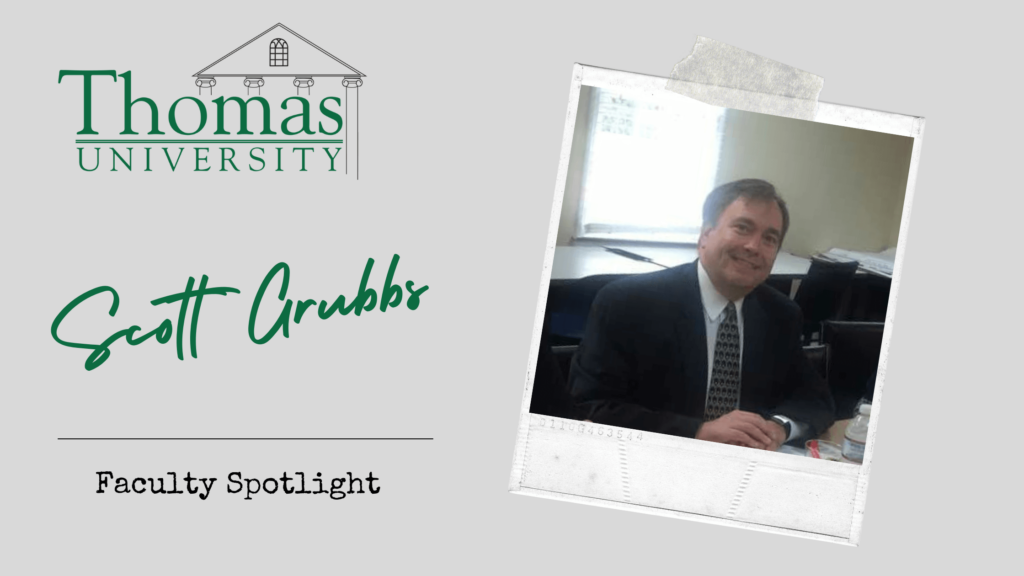What programs do you teach at Thomas University? What Drew you to this field of study/What keeps you excited about it?
We live in exciting times, and education—specifically, teachers—are on the front lines. As an Assistant Professor of Education at Thomas University, I get to work with current and future teachers as they prepare their students to meet the opportunities and challenges present in our world. In both the Initial Teacher Preparation and Curriculum and Instruction programs, I help our students think more deeply about their professional practices in areas that include diversity, current educational issues and trends, and educational research. The idea that I can empower teachers to become powerful advocates for their students and themselves by enabling them to transfer what they learn in our programs into best practices keeps me energized to continue to be an active contributor and learner in the education profession.
How will your programs better prepare/equip educators for the current climate they are facing? How will it help them tackle the challenges of COVID and post-COVID teaching?
Our programs are focused on preparing our students for the realities of teaching within the contexts of schools and society. To do this, we prepare them to work successfully with diverse learners by providing equitable educational opportunities and safe classroom environments where all students can learn. We also help teachers become more effective educational practitioners by using research to target specific questions and issues that influence how their students learn. Through their preparation in research, our students are able proactively improve student learning and have a deeper understanding of what research, evidence, and data mean.
Additionally, through instruction in areas such as social-emotional learning, our programs help teachers to support their students better holistically by adding to their understanding that students are more than intellect. Indeed, true learning involves the heart and body as well as the brain. All of these elements have been present in our programs pre-COVID, but they have taken on additional importance to our students post-COVID, and the feedback from our students speaks to the value of what we provide in this new, post-COVID environment.
What attracted you to Thomas University? What sets them apart?
For me, Thomas University offers its students and faculty a strong sense of community and family that is becoming harder to find, especially at larger institutions. Given our size, nobody remains a stranger for long and no student is “just a number.”
That means that we celebrate our students’ and colleagues’ triumphs, support each other when times get tough, and roll up our sleeves to help whenever and however we can. In short, Thomas University is a place that demonstrates that high standards and a rigorous education can take place in a positive, caring environment, and I am honored to be a part of that culture.
What is your professional background (including degrees) as an educator?
I have been an educator for over 30 years at the secondary and post-secondary levels. I taught high school French for 10 years at Coffee High School in Douglas, Georgia, and taught for 14 years at Valdosta State University before coming to Thomas University in 2016. In addition, I have served as a high school department chair, an instructor for the Georgia Governor’s Honors Program, an accreditation coordinator at the post-secondary level, and serve as a Program Review Chair for the Georgia Professional Standards Commission. My research areas of interest include educational politics and policy, educator ethics, rural education, and academic accreditation.
My degrees include:
- AB in French, University of Georgia
- M.Ed. Educational Leadership, Valdosta State University
- Ed.S. Teacher Leadership, Thomas University
Tell us a little bit about yourself. Why did you become interested in education?
To be completely honest, my educational journey is an example of how life can take you in unexpected directions. I am the first person in my family to take up education as a profession (everybody else was in either business or medicine), but when I started college, being a teacher was the farthest thought from my mind. I began my studies as a Russian Area Studies major but realized that was not really what interested me. Eventually, I became a French major and after graduation decided to teach in a public school for a year before I started graduate studies. Much to my surprise (and gratitude) one year became two years and two years became a decade! From that point, there was no looking back; I was a career educator.
After 10 wonderful years of teaching high school, I realized that it was time to explore other areas of education. I was fortunate enough to help prepare educators at Valdosta State University, where I also developed a love for issues ranging from accreditation to educational policy, professional passions that I have been able to bring to my current position at Thomas University. Moving forward, I look forward to seeing where else this long and winding educational journey will take me, and I can’t wait to see what happens next!
What would you tell prospective students considering your programs about yourself? What’s something that students and colleagues should know about you?
I have a deep appreciation of knowledge, wisdom, reason, and critical thinking, and I value students who also treasure these elements of education. I love seeing students take what they learn in my courses and combine them with their personal and professional journeys to arrive at new or different understandings. I also love learning from my students when they “respectfully disagree” and use the powers of knowledge and reason to help me broaden my perspectives and think new thoughts. I very much believe that the best teachers learn from their students, and I am gratified when that happens.
By now, I am not sure that there is anything that my colleagues don’t know about me, but I hope that they understand that I care deeply about the educational issues that I teach and that I care very much about my students. Also, I think they have come to realize that I have a pretty dry sense of humor to the extent that it has been branded “wicked” by at least one of them!
What advice do you have for students interested in pursuing their graduate education degree? How can people stand out in this field?
Often, graduate students fail to finish their degrees due to the challenges of managing graduate studies along with professional and personal commitments. So perhaps the best advice I have to offer prospective graduate students is to make sure that they have strong time management skills and have the support they need from the “key stakeholders” in their lives to successfully complete their programs. If graduate students are effective stewards of their time, and if they have the support of their supervisors, family members, friends, etc., then the odds of being successful increase dramatically.
The role of educators in the post-COVID world is changing in the sense that successful educators are not just purveyors of instruction but are also leaders and advocates for the profession. Hence, successful educators model empowerment by leading their colleagues—either formally or informally—to be better educators, better professionals. They are the ones that will provide the solutions to the challenges facing teachers, students, schools, and communities, and they will be the ones to marshal the people and resources to ensure that educators can truly fulfill the personal and professional commitments they make to their students and themselves.

